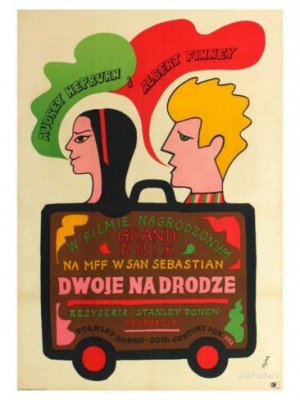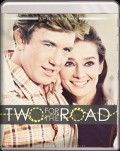| Reviews & Columns |
|
Reviews DVD TV on DVD Blu-ray 4K UHD International DVDs In Theaters Reviews by Studio Video Games Features Collector Series DVDs Easter Egg Database Interviews DVD Talk Radio Feature Articles Columns Anime Talk DVD Savant Horror DVDs The M.O.D. Squad Art House HD Talk Silent DVD
|
DVD Talk Forum |
|
|
| Resources |
|
DVD Price Search Customer Service #'s RCE Info Links |
|
Columns
|
|
|
Two for the Road
Such is the ambiguous nature of this experimental, funny, sad, densely innovative movie so many adore. An exploration of the highs and lows of romance, marriage, and parenthood, it's emotionally honest as few Hollywood-produced movies were back then (including straight drama), and it resonates even now. Audrey Hepburn and Albert Finney star. It's among their finest work as actors, and maybe Hepburn's finest-ever film performance. Beyond Donen's excellent direction and Frederic Raphael's clever screenplay, the supporting cast, Christopher Challis's cinematography, Henry Mancini's lovely score, and Maurice Binder's title design (among many other things) all contribute to the picture's success.
Twilight Time's new Blu-ray, licensed from Fox, offers a superb 1080p transfer, Donen's wonderful commentary track from the laserdisc version and more.
The non-linear film juxtaposes annual road trips to France taken by English couple Mark (Finney) and Joanna (Hepburn), from their first meeting up to the present day. The story freely moves backwards and forwards in time, often to note ironies and make comparisons of statements and actions made at two different points in their relationship. The precise years each sub-story takes place is only hinted at. Wikipedia's entry on the film places their first meeting, on an English Channel crossing, in 1954, but other clues suggest it was significantly later than that.
Regardless, the story seems to consist of at least seven different trips, while focusing primarily on four. In the first, Mark and Joanna meet and fall in love. In the second, they travel with Mark's pretentious former lover from America, Cathy (Eleanor Bron), her fussy husband, Howard (William Daniels), and their overindulged, bratty daughter, Ruthie (Gabrielle Middleton). (Bron and Daniels are very funny as typically know-all, would-be sophisticates.)
The third major sub-story finds Mark and Joanna stranded at a luxury hotel, unable to afford to eat at its pricey restaurant, and where budding architect Mark meets his future employer, demanding millionaire Maurice Dalbret (Claude Dauphin), and his wife, Françoise (Nadia Gray). The story is bookended (and frequently cuts back to) the present day, during which Marc and Joanna seriously contemplate divorce.
Two for the Road is at once lushly romantic and charming, in scenes where Mark and Joanna meet and fall in love, yet also painful when in the present-day sequences their bitterness toward one another prompts cruel, almost sadistic behavior. She resents his submissiveness to Maurice, he of her jet-setting lifestyle and the financial demands that entails. He's very much a typical early postwar man: ambitious, chauvinistic, eager to prove his manhood, and frequently insensitive. She starts out sweet if subtly calculating, but eventually her optimism sours and she becomes as relentlessly sarcastic as he's always been. My one complaint for years about the film was her over-the-top designer clothes, an apparent concession to Hepburn's status as a sophisticated fashion plate. Today, though, it actually sort of works, expressing the emptiness of Joanna's excessive materialism. Maybe Donen planned it that way all along.
Their marriage seems doomed early on, with many more nails hammered into its coffin along the ride, and yet may be salvaged for reasons all longtime couples understand but which is rarely suggested in movies: years of shared experiences. One of the film's many running gags-motifs begins when they spot an older couple silently eating together in a café. "What kind of people can sit there without a word to say to each other?" Joanna asks. "Married people," Mark replies, and that line is heard again and again throughout the film. When Joanne has for a time left Mark for Françoise's brother, David (Georges Descrières), Joanna suddenly blurts out "Married people!" in response to something she sees, momentarily unaware that Mark is no longer around to hear it.
The screenplay by Frederic Raphael (Darling, Eyes Wide Shut) and Donen's cutting are almost too clever for their own good, with transitions that, while eye-catching and startling, at times draw attention away from the emotional core of the story. On the other hand, an equal amount is very clever and subtle, such as the almost imperceptible but highly effective jump cut when Joanna suddenly rushes into Mark's arms. Similarly, the obvious road-as-metaphor pays off and, impressively, Donen and Raphael clearly have thought through every moment of the film to underscore and enhance each moment's effectiveness.
Another running gag concerns Mark's perpetually misplaced passport, for which Joanna invariably comes to his rescue. Like the "married people" bit, at first it seems overworked until one realizes that not only does she probably deliberately hide it from him to assert a bit of wifely control over her husband, it eventually suggests that perhaps they really have come to genuinely depend upon one another.
Albert Finney is so good as Mark that we can understand Joanna's attraction to such a moody, self-involved man who thinks too much and lives too little. Hepburn, as always, is effervescent, but the underlying sadness of her character, psychologically beaten down through the years by Mark, robs her of her energy and determination to charm him past his curmudgeonly moods. In so doing, while his infidelity comes as no surprise, hers - and her total lack of any guilt at this point - comes as a real shock. At 37, Hepburn was seven years older than Finney, and in the present-day scenes is, while still beautiful, clearly entering middle age. Hepburn seemed to recognize the importance of the film, giving a performance far more memorable in a far more memorable film than such better-known trifles as Breakfast and Tiffany's and My Fair Lady.
Video & Audio
Gorgeously lensed in Panavision, Two for the Road looks stunning, with far better color and clarity than any previous home video version. The 1.0 DTS-HD Master Audio (English mono) audio is also excellent, and optional English subtitles are offered. Region free.
Extra Features
Beyond Donen's commentary, really one of the best from home video's previous era, there's a second track featuring Nick Redman and Julie Kirgo, the latter also providing a booklet essay. An isolated track of Mancini's score is a big plus, and there's a trailer and what looks like raw, silent Fox Movietone footage of the Academy Awards ceremony for the 1967 year, with Hepburn presenting an Oscar to Rod Steiger and his bad toupee.
Parting Thoughts
One of the great films of the 1960s, here looking better than ever, Two for the Road is a DVD Talk Collector Series title.
Stuart Galbraith IV is the Kyoto-based film historian largely absent from reviewing these days while he restores a 200-year-old Japanese farmhouse.
|
| Popular Reviews |
| Sponsored Links |
|
|
| Sponsored Links |
|
|
| Release List | Reviews | Shop | Newsletter | Forum | DVD Giveaways | Blu-Ray | Advertise |
|
Copyright 2024 DVDTalk.com All Rights Reserved. Legal Info, Privacy Policy, Terms of Use,
Manage Preferences,
Your Privacy Choices | |||||||













